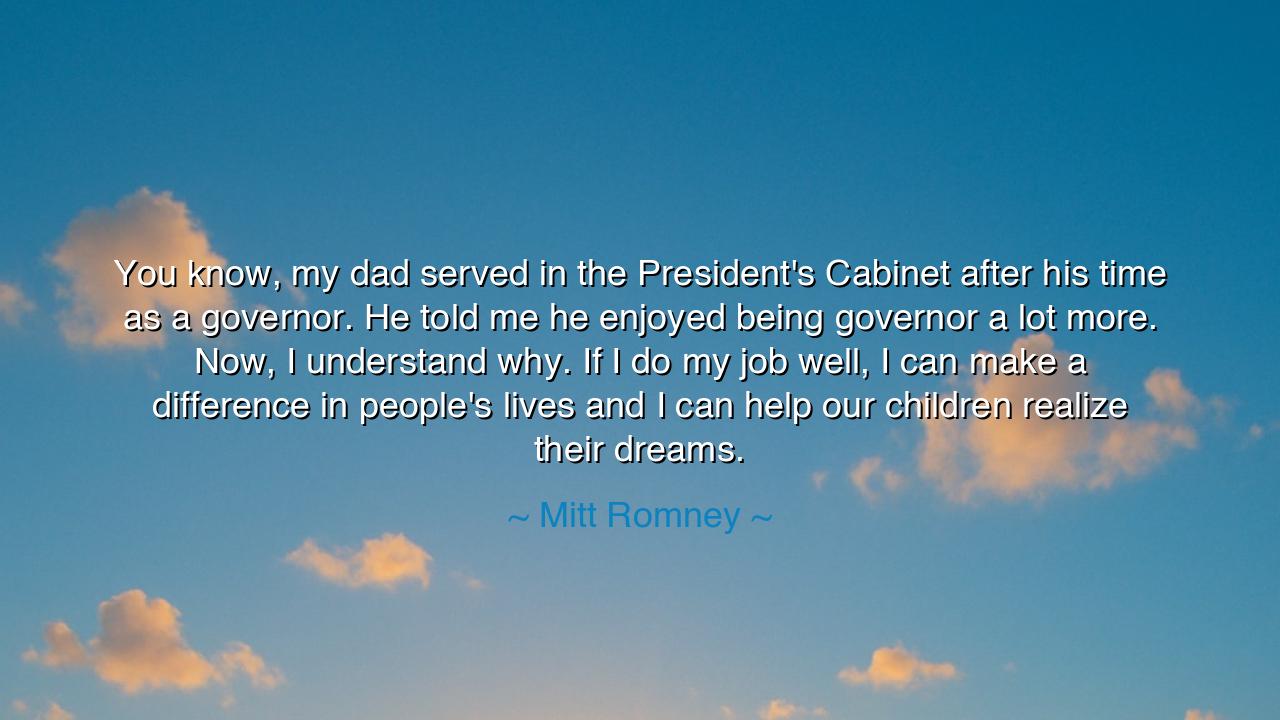
You know, my dad served in the President's Cabinet after his time
You know, my dad served in the President's Cabinet after his time as a governor. He told me he enjoyed being governor a lot more. Now, I understand why. If I do my job well, I can make a difference in people's lives and I can help our children realize their dreams.






When Mitt Romney said, “You know, my dad served in the President's Cabinet after his time as a governor. He told me he enjoyed being governor a lot more. Now, I understand why. If I do my job well, I can make a difference in people's lives and I can help our children realize their dreams,” he was not merely reflecting on public service — he was revealing the heart of leadership itself. In these words lies an ancient truth: that power without proximity to the people is hollow, and that the truest form of governance is not in commanding from afar, but in serving with compassion, vision, and purpose. Romney’s reflection transforms political insight into moral wisdom — the realization that greatness in leadership is measured not by prestige, but by impact.
The origin of this quote reaches into Romney’s lineage and legacy. His father, George Romney, once Governor of Michigan and later a member of President Nixon’s Cabinet, embodied the classical American archetype of the servant-leader — a man who entered public office not to dominate, but to uplift. The younger Romney, walking in his father’s footsteps as Governor of Massachusetts, came to see firsthand what his father had meant. In the office of a governor, one stands closer to the people’s struggles — the classrooms, the neighborhoods, the families — where decisions are not abstractions but living consequences. It is there, in that nearness, that a leader begins to grasp the sacred responsibility of governance: to make a difference in people’s lives.
To the ancients, this lesson was not new. In the philosophies of Confucius, the ruler was described not as a distant monarch, but as a moral shepherd whose duty was to ensure harmony and virtue among his people. Likewise, the Roman philosopher Marcus Aurelius, though emperor of the known world, wrote in his Meditations not of conquest, but of service: “What is not good for the beehive cannot be good for the bee.” Mitt Romney’s reflection carries the same humility — the recognition that the worth of power is found only in how it is used to bless others. A governor, unlike a cabinet official bound to national machinery, wields power that touches the daily bread of the people. It is a calling that demands empathy as much as intellect, and courage as much as competence.
Romney’s words also reveal a deeper wisdom about leadership and fulfillment. His father’s insight — that being governor brought greater satisfaction — speaks to a universal truth: that joy comes not from titles, but from tangible service. When a leader can see the fruits of his labor — a new school built, a child educated, a family lifted from despair — he partakes in something eternal. For in every age, the leaders who have truly mattered are those who became builders of hope, not seekers of fame. One recalls the example of Pericles of Athens, who transformed his city not through war, but through art, democracy, and education. His power was not in edicts, but in the inspiration he gave his people to believe in their collective greatness.
And yet, Romney’s quote also carries the weight of responsibility. To “make a difference in people’s lives” and to “help children realize their dreams” are not easy tasks — they demand both vision and sacrifice. The ancient teachers knew that a ruler’s happiness could never be separated from his people’s welfare. If the people suffer, the leader’s honor diminishes; if the people thrive, his soul is lifted. To govern well is to be burdened with both the power to heal and the temptation to forget. Thus, Romney’s understanding — like his father’s — is a call to remain close to the ground, to listen to the humble, to remember always that leadership begins in service, not status.
History offers many examples of those who forgot this truth — rulers who sought grandeur over goodness, power over purpose. Yet it also offers shining lights: Abraham Lincoln, who bore the sorrows of a divided nation as his own; Nelson Mandela, who transformed imprisonment into forgiveness; George Washington, who chose to relinquish power when others would have clung to it. All these men understood that leadership’s ultimate aim is not control, but liberation — to give others the freedom and opportunity to fulfill their destiny. Romney’s phrase, “help our children realize their dreams,” echoes this same timeless ideal: that the truest victory of a leader is when those who follow him no longer need him.
So, my child, take this teaching to heart: lead not for glory, but for goodness. Whether your field is a nation, a company, or a household, remember that the measure of your leadership is not in the strength of your authority, but in the light you awaken in others. To serve is not to stoop — it is to rise, to align oneself with the higher order of love and justice that governs the universe. As Mitt Romney came to understand, the joy of true leadership is not in being remembered as powerful, but in knowing that through your labor, even one child dared to dream and believed that the world could be better because you cared.






AAdministratorAdministrator
Welcome, honored guests. Please leave a comment, we will respond soon